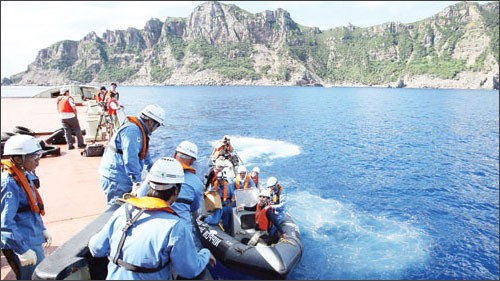Japan’s nationalization of Senkaku Islands infuriates China
 |
| Japanese researchers in Senkaku/Diaoyu Islands on September 02nd (Photo: AFP) |
(VOVworld) – Declaring Japan’s sovereignty over the Senkaku Islands, which China calls the Diaoyu Islands, the Japanese cabinet on Tuesday approved the nationalization of three islets in the group. Tokyo’s move has sparked public alarm about a possible Sino – Japanese clash. VOV’s Anh Huyen comments….
Japan’s nationalization of three of the disputed Senkaku Islands was announced after a Ministers’ meeting on Monday. Chief Cabinet Secretary Osamu Fujimura said three of the five main islets in Senkaku will be purchased from a private landowner for about 26 million USD.
Although Japan says the move is intended to maintain stability and relieve the current tension, Tokyo’s decision has infuriated Beijing. Chinese Prime Minister Wen Jiabao says Beijing will “never yield an inch” in its dispute over the islands. Beijing summoned the Japanese Ambassador to lodge a vehement protest against Tokyo’s provocative act. Earlier, at a meeting with Japanese Prime Minister Yoshihiko Noda on the sidelines of the APEC summit in Vladivostock, Russia, Chinese President Hu Jintao decalred Beijing’s opposition to Japan’s purchasing the island and said China will apply any necessary measures to reassert its sovereignty there.
The Senkaku a.k.a Diaoyu Islands are a group of uninhabited islands in the east China Sea. They are located between mainland China and Japan’s island province of Okinawa. This area is believed to have large oil and gas deposits, besides being an abundant fishery. The sovereignty dispute has been a source of tension for decades. In 1972, when the two countries restored their diplomatic relations, Chinese Prime Minister Zhou Enlai agreed to table the Senkaku issue until an appropriate future time. In 1978, when the two nations signed an historic pact, Chinese leaders said the issue would be resolved by future generations. But in reality, the issue continued to fester. A new crisis was sparked last month when a group of Chinese activists raised China’s flag on Senkaku. Japan immediately responded by firing at a Chinese boat and arresting 14 Chinese activists. That was followed by Japan landing on Senkaku and holding a joint military exercise with the US. Crowds of angry Chinese took to the streets to demonstrate and demolish Japanese cars and restaurants. A Chinese General called for sending 100 ships to defend the Diaoyu Islands.
In response to Beijing’s threats, Tokyo moved to nationalize the islands, insisting that that Senkaku is an integral part of the Japanese territory, historically and under international law. Analysts say Japan is in a strong position. Once the nationalization has been completed, China will have to accept a demarcation of the continental shelf in the East China Sea on Tokyo’s terms. But Beijing is concerned about a US – Japan military alliance becoming more threatening to China’s security.
Anh Huyen